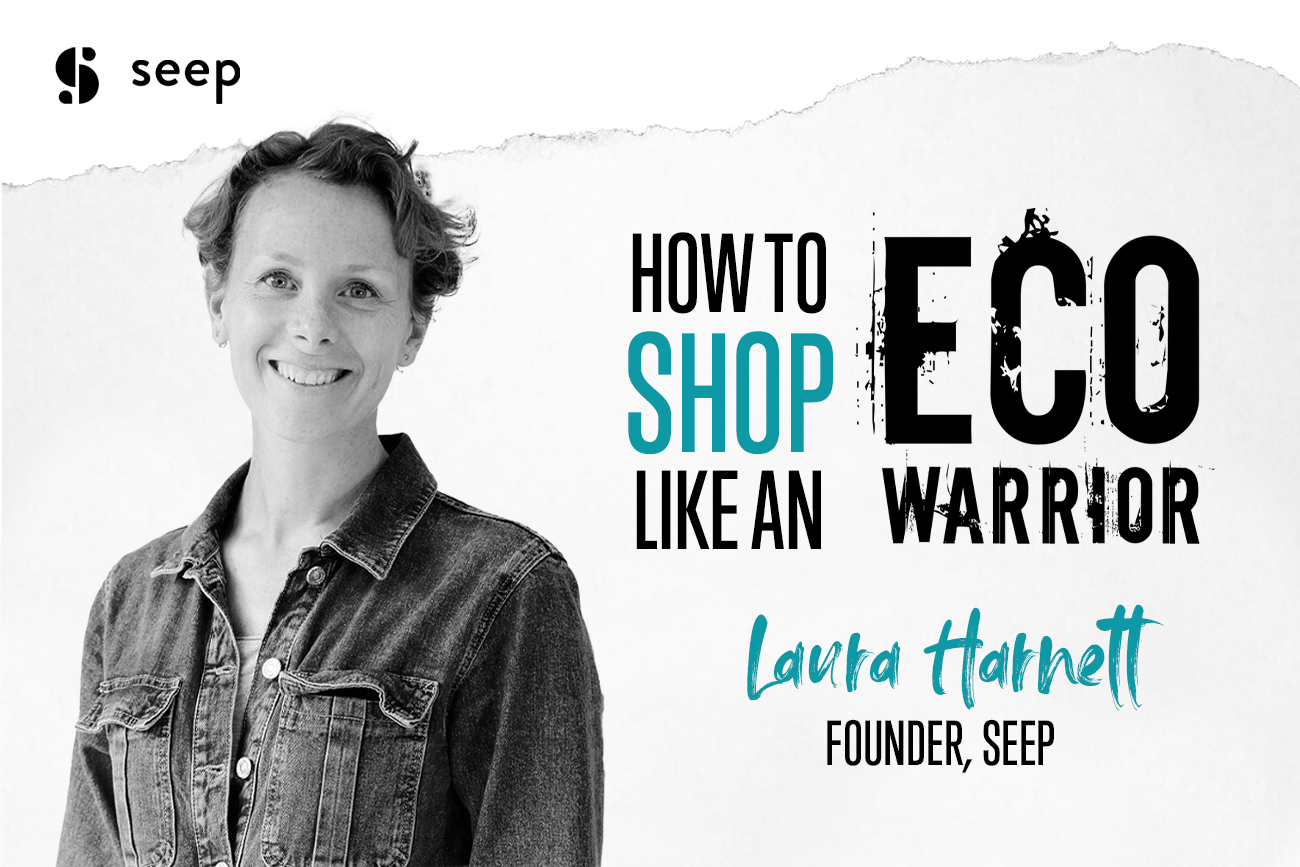We created our ‘How to Shop Like an Eco Warrior’ podcast series to help you get a step closer to living a greener, more sustainable lifestyle. Throughout the series we discuss the issues, share the trends and ideas through interviews with other awesome and exciting challenger brands. And ultimately, you’ll go away inspired and empowered to make little changes in your life that will help protect the earth.
Read below to read our full interview with Laura Harnett, Founder of Seep.

Please tell us a little bit about Seep. Why did the brand begin?
So the ‘aha’ moment for Seep was walking around my local supermarket. I described myself as eco-conscious not necessarily an eco warrior but when I do my own weekly shop, I try and choose better for the planet products that could be organic or recycled.
I was walking down the kind of cleaning aisle and on one side of the cleaning aisle you can now pick up eco brands and products, including Ecover amongst other challenger brands. But on the other side of the cleaning aisle is often sort of household essentials and it’s this selection of products, that you know really have not changed in years. So their products like sponges, cloths and bin liners and I was looking for where the better product was here that wasn’t going to harm the environment and there really was nothing.
So I am not what I used to think, was a typical founder profile, you know, I’m not in my 20s. I’m in my 40s. I’ve spent 20 years working for other consumer brands and retailers. And I always thought I didn’t have the courage to become a founder or the kind of flash of inspiration and I think there’s a lot of people probably my generation where it just wasn’t a thing you would leave you leave university into a steady job. And so, I had a good career working my way up various organisations. I’ve got two kids, so it’s a pretty stressful life and was diagnosed with breast cancer a few years ago. And there were so many silver linings, you know, it was being there a bit more with my kids when I was going through it and it just gives you a moment to pause and I just hadn’t stood still for a long time until that point. I was diagnosed five years ago and I’m back out the other side, but I’m really grateful for it because it just made me stop and think; I’ve got and halfway through my career, what do I want to do with the next 20 years? I wanted to build something of my own that I could feel passionately about. And that would make a difference.
So what is it about your products and what they’re made of, that helps people make a difference to people’s sustainability at home?
When it comes to the products you’re currently picking up, they will be made of plastic. You’ll only use this sponge a few times before you’ll be releasing microplastics down your sink. These microplastics will then go straight down the sink and into the water systems and out into the oceans. And at the end of their life, you currently have to throw these in the bin, where they either will be burnt in an incinerator or in end up in landfill. Our mantra is ‘Do no harm’. So whatever we’re using to create our products, it should leave no trace behind. And so at the end of the life of our sponges, you can cut them up, put them on top of your compost heap, and it should break down in a compost heap in less than three months.
Do you think that sustainable products are accessible to the masses?
At the moment, sustainable products do cost more money. So you know, if you look at a slab of scouring sponges in Wilko, for example, you can probably buy 10 of them for £2-3. As a result of that people go through them really quickly, because they’re so cheap. Whereas ours are more expensive, it roughly works out at about £2 for our sponge. But it lasts for somewhere between one and two months. So at the moment, they are more expensive, but the hope is over time with volumes, that we can find some new ways of producing these products, that the cost will come down, and we can make these more accessible to other people. And I’m also hoping the whole category will wake up to the fact that there’s a better way of producing these products, if it can stir up a bit of innovation in the industry, then that’s going to be good for everyone.
Do you have a view on greenwashing?
It’s a complete minefield and there are lots of different levels of greenwashing. There’s the greenwashing that we’re seeing at the moment with fast-fashion retailers, who will produce a micro range that will be made from slightly more sustainable fibres. They’ll be using that to get the word out that they’re better for the planet.
Then there’s a sort of murky area where suppliers brands are trying to do the right thing. You know, there’s been a lot of debate recently about these tote bags, with people swapping out of plastic bags and into tote bags. You know, and there’s been a bit of a backlash to actually you need to use a tote bag 300 times before it actually makes sense from a carbon footprint perspective.
For me greenwashing is someone who’s knowingly putting something out there that isn’t better for you or the planet. There’s an undercurrent of deception or trying to move the conversation away from it. If a brand is genuinely trying to do something they think is better then it’s up to us to raise awareness, driving and challenging what some brands think is acceptable.
If there was one thing a customer could do tomorrow to become more sustainable what would it be (other than buying your products of course!)?
I honestly think that one of the best things is to educate yourself. So there are loads and loads of influencers out there and there’s more information than ever out there, make sure you find some really good, well-researched sources behind things!
So the places I’d look for really well-researched information is the ‘Ethical Consumer’ who are very robust in the way they research products and companies. And I think you need to work out what’s right for you as well. You know, there’s, you know, there’s a really good quote that’s often quoted, which is “It’s better to have lots of people living sustainably imperfectly, then a few people living sustainably impact absolutely perfectly.”


